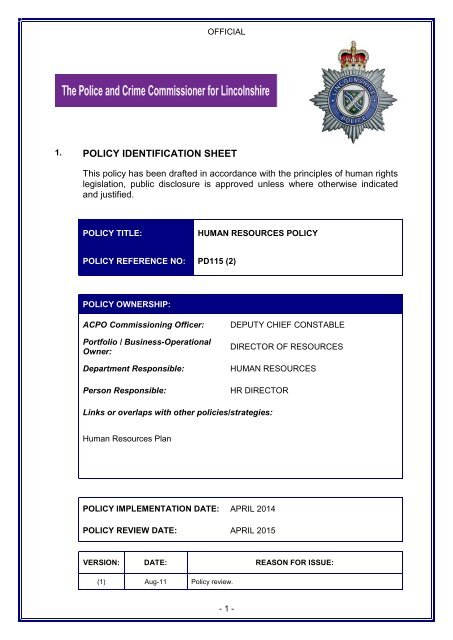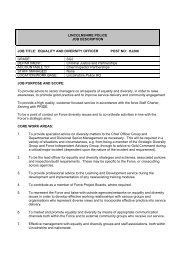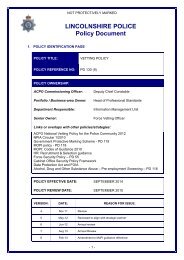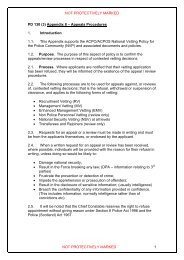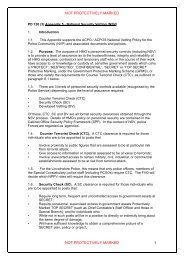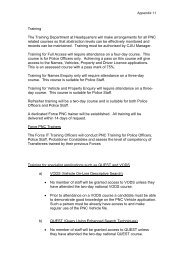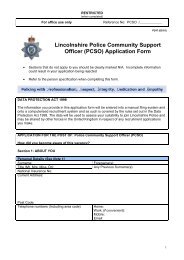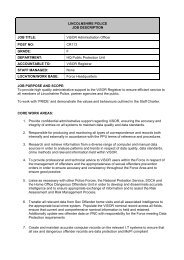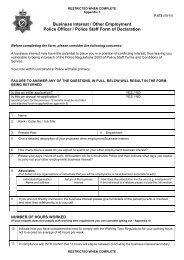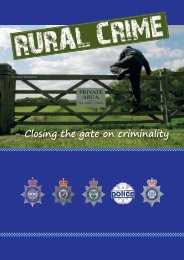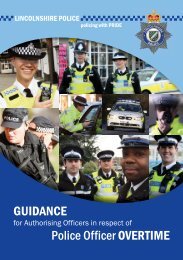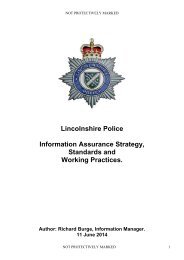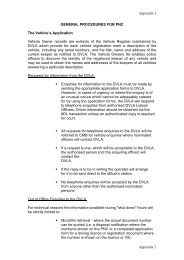Human Resources Policy.pdf - Lincolnshire Police
Human Resources Policy.pdf - Lincolnshire Police
Human Resources Policy.pdf - Lincolnshire Police
You also want an ePaper? Increase the reach of your titles
YUMPU automatically turns print PDFs into web optimized ePapers that Google loves.
OFFICIAL<br />
1. POLICY IDENTIFICATION SHEET<br />
This policy has been drafted in accordance with the principles of human rights<br />
legislation, public disclosure is approved unless where otherwise indicated<br />
and justified.<br />
POLICY TITLE:<br />
HUMAN RESOURCES POLICY<br />
POLICY REFERENCE NO: PD115 (2)<br />
POLICY OWNERSHIP:<br />
ACPO Commissioning Officer:<br />
Portfolio / Business-Operational<br />
Owner:<br />
Department Responsible:<br />
Person Responsible:<br />
DEPUTY CHIEF CONSTABLE<br />
DIRECTOR OF RESOURCES<br />
HUMAN RESOURCES<br />
HR DIRECTOR<br />
Links or overlaps with other policies/strategies:<br />
<strong>Human</strong> <strong>Resources</strong> Plan<br />
POLICY IMPLEMENTATION DATE: APRIL 2014<br />
POLICY REVIEW DATE: APRIL 2015<br />
VERSION: DATE: REASON FOR ISSUE:<br />
(1) Aug-11 <strong>Policy</strong> review.<br />
- 1 -
OFFICIAL<br />
(2) Apr-14 <strong>Policy</strong> reviewed<br />
2. POLICY STATEMENTS/INTENTIONS<br />
2.1 The principles and scope of the policy<br />
This is the <strong>Police</strong> and Crime Commissioner for <strong>Lincolnshire</strong> and the Chief Constable<br />
of <strong>Lincolnshire</strong> <strong>Police</strong> <strong>Human</strong> <strong>Resources</strong> umbrella policy, which covers all HR<br />
procedures including guidance and schemes.<br />
The term „staff‟ relates to the <strong>Police</strong> and Crime Commissioner for <strong>Lincolnshire</strong><br />
employees and <strong>Lincolnshire</strong> <strong>Police</strong> Staff.<br />
2.2 The aim of the policy<br />
HR, like other business areas contributes to the strategic aims and priorities of the<br />
organisation. The aim of the policy is to provide a framework for HR procedures and<br />
guidance documents to be adhered to.<br />
3. INTRODUCTION/LEGAL BASIS<br />
3.1 The origins/background information<br />
This policy recognises that managers are the “front-line” of the HR service. The way<br />
in which they lead and manage their staff has a major impact on whether or not our<br />
workforce feels:<br />
<br />
<br />
<br />
skilled;<br />
highly motivated and well led;<br />
supported and valued.<br />
The behaviours and values are expected by managers to display are set out in the<br />
Leadership and Staff Charters. The Leadership Charter sets out expectations of<br />
everyone in a leadership and management position or those who are responsible for<br />
staff. The Staff Charter sets out the values and behaviors we expect of everyone in<br />
the organisation.<br />
3.2 Motivators/Driving Forces<br />
The HR policy provides an opportunity to bring HR procedures, guidance and<br />
schemes together under one framework.<br />
3.3 General Principles of the <strong>Policy</strong><br />
We will apply HR policy and procedures in a fair and reasonable way. We will aim to<br />
balance the need<br />
- 2 -
OFFICIAL<br />
<br />
<br />
to take account of individual circumstances<br />
to provide services to our communities which will improve their trust and<br />
confidence in <strong>Lincolnshire</strong> <strong>Police</strong><br />
All the HR procedures that are covered by this HR ‘umbrella’ policy are listed<br />
below. The list will be updated on an annual basis.<br />
30+ Scheme Annual Review Process<br />
The 30+ <strong>Police</strong> Retention Scheme is designed to assist police forces in retaining<br />
officers with 30 years‟ pensionable service who have valuable skills and experience.<br />
This annual review outlines the process for reviewing police officers who are<br />
members of the 30+ scheme.<br />
Access to Personal Files<br />
This procedure details how information will be stored and retained in police officers,<br />
staff and members of the Special Constabulary personal files in accordance with the<br />
Data Protection Act (1998), the Freedom of Information Act (2000) and the<br />
recommendations of the ACPO Code of Practice. The procedure has been written<br />
to comply with current equality principles.<br />
Acting Procedures<br />
The procedure clarifies the process for Constables on acting duty to Sergeant,<br />
Sergeant to Inspector and Inspector to Chief Inspector. The HR Operations Team<br />
regularly reviews the profiles of officers who are on acting up duty to address any<br />
equalities concerns.<br />
Alcohol, Drugs and Other Substance Abuse – Pre Employment Screening<br />
The policy outlines the mechanisms in place for alcohol and drug screening and the<br />
associated welfare and conduct issues relating to alcohol, drugs and other<br />
substance misuse. HR is responsible, with the external provider, for administering<br />
the pre-employment screening of a percentage of potential new starters. Those<br />
subject to screening are selected randomly.<br />
Allocation of new starters (<strong>Police</strong> Officers)<br />
The procedure describes the process for allocating postings for new police officers.<br />
HR will monitor the workforce profile across the Force to make sure that there is no<br />
disproportionality amongst under-represented groups.<br />
Annual Leave <strong>Police</strong> Officers<br />
The procedure outlines annual leave entitlement for full time and part time police<br />
officers. Annual leave entitlement is linked to length of service in accordance with<br />
the <strong>Police</strong> Regulation 33.<br />
Bonus Payments Scheme<br />
- 3 -
OFFICIAL<br />
The Scheme has been produced in accordance with the PNB agreement <strong>Police</strong> Pay<br />
and Conditions. Incident specific bonuses may be awarded for work of an<br />
outstandingly demanding nature.<br />
Recommendations made by the Head of Department will be considered quarterly by<br />
the moderation panel and the decision confirmed by the Chief Constable. The panel<br />
will comprise of a Chief Superintendent, a Federation representative and a HR<br />
representative.<br />
The guidance also includes the “On Call” scheme for police officers. The Head of<br />
Department is responsible for making sure that a formal „on call‟ rota is in place.<br />
Career Breaks<br />
The <strong>Policy</strong> details the criteria to apply for a career break. Career breaks are subject<br />
to the Chief Constable‟s agreement, for up to a maximum of 5 years. <strong>Police</strong> officers<br />
and staff are not paid during career breaks, nor does qualification as reckonable<br />
service applies for pension, annual leave, increments or any other employment<br />
benefits.<br />
Chief Officer Relocation <strong>Policy</strong><br />
This document sets out the <strong>Police</strong> and Crime Commissioner for <strong>Lincolnshire</strong> and<br />
<strong>Lincolnshire</strong> <strong>Police</strong> policy on Chief Officer relocation expenses.<br />
Competence Related Threshold Payments (CRTP) Scheme<br />
This is the Force‟s scheme, which reflects the PNB <strong>Police</strong> Pay and Conditions<br />
Agreement that allows <strong>Police</strong> Officers to apply for a Competence Related Threshold<br />
Payment (CRTP) once they have served for at least one year at the maximum of<br />
their pay scale. The criteria relate to high professional competence in four elements.<br />
There is an assessment, determination and appeals process.<br />
The CRTP scheme is closed to new applications from 1 April 2013. Following the<br />
Winsor Independent Review Part 1, the CRTP scheme will be retained for those<br />
officers already in receipt of CRTP however, from 1 April 2013 the CRTP payment<br />
amount will be reduced each year until 1 April 2016. The CRTP scheme will then<br />
cease on 1 April 2016.<br />
Each year, the Force undertakes a survey return to the PNB providing equalities<br />
data. This relates to those officers that have applied for the payment, have been<br />
accepted or refused and who may have had a CRTP payment taken off them.<br />
Disability<br />
Manager‟s guidance on employing, retaining and making reasonable adjustments<br />
for disabled people. This is positive guidance, which supports the entire workforce in<br />
operating within the Equality Act (2010).<br />
Disciplinary Procedure (Staff)<br />
Disciplinary action is designed to make sure that standards of conduct and<br />
behaviour are achieved and maintained. This does not include capability, for which<br />
there is a separate procedure. The HR Operations Team monitors cases to identify<br />
adverse trends and provides a summary of disciplinary cases for Staff to the<br />
Professional Standards Department on a regular basis.<br />
- 4 -
OFFICIAL<br />
Exit Interview/Questionnaires<br />
The exit interview/questionnaire process has been designed to give people the<br />
opportunity to provide honest feedback about why they have decided to leave the<br />
organisation. From this any patterns or trends can be identified within the<br />
organisation which may need addressing via policies, procedures or practices.<br />
Leavers are sent exit questionnaires and the HR Operations Team monitors leavers<br />
and invite those from key priority groups to exit interviews. <strong>Lincolnshire</strong> <strong>Police</strong> also<br />
provides the Home Office with figures on the exit questionnaires that are completed<br />
on an annual basis.<br />
Facilities Agreement<br />
This details the Trade Union recognition working agreement between <strong>Lincolnshire</strong><br />
<strong>Police</strong> and the <strong>Lincolnshire</strong> <strong>Police</strong> Unison Branch.<br />
Fairness at Work<br />
The Fairness at Work procedure sets out the steps to be followed when an<br />
individual wishes to raise a workplace complaint or concern. Its aim is to facilitate<br />
the resolution of complaints fairly, at an appropriate level and with minimum delay.<br />
The procedure complies with the grievance resolution processes that employers are<br />
required by law to have as part of the Dispute Resolution Regulations 2004. It also<br />
complies with the good practice principles reflected within the ACAS Code of<br />
Practice on handling grievances.<br />
Flexible Retirement (Staff)<br />
The procedure describes what flexible retirement is and how to apply for it. The HR<br />
Operations Team track applications made under the procedure to ensure that no<br />
applications are refused on unjustifiable grounds.<br />
Flexi-Time Scheme<br />
The scheme details the eligibility criteria and entitlements to Flexi-Time for non<br />
operational staff.<br />
Flexible Working Procedure<br />
The procedure describes what flexible working is and how to apply for it. The<br />
procedure applies to police officers, student officers and staff. HR monitors<br />
applications made under the procedure to identify any equality concerns.<br />
Giving Effective Feedback<br />
This guidance document is for managers to assist them in giving effective feedback<br />
to police officers and staff to establish good working relationships and develop staff<br />
performance.<br />
Health & Safety <strong>Policy</strong><br />
This policy sets out the organisation‟s general policy for safeguarding the health,<br />
safety and wellbeing of its employees and others, in conjunction with the Strategic<br />
Partner. The policy complies with the Health and Safety at Work, etc Act 1974 and<br />
the <strong>Police</strong> Health and Safety Act 1997 to provide safe and healthy workplaces and<br />
working environments for all persons, both employees and non-employees whilst<br />
- 5 -
OFFICIAL<br />
complying with the Equality Act 2010 and the <strong>Human</strong> Rights Act 1998.<br />
Honoraria Awards<br />
The document outlines the process and criteria for staff that may be eligible for an<br />
honorarium payment. Heads of Department approve these requests of up to £500,<br />
any payment over £500 are subject to the approval of the Head of Finance.<br />
Reports are available that identify any disproportionate trends in the application of<br />
honoraria awards.<br />
Ill Health Retirement (<strong>Police</strong> Officers)<br />
The procedure outlines the management of the ill-health retirement of <strong>Police</strong><br />
Officers including the referral process, the decision making process at Chief Officer<br />
Group level and details how to appeal. The HR Operations Team reports regularly<br />
on retirements being processed in line with the procedure and to identify any<br />
disproportionate trends.<br />
Ill Health Retirement (Staff)<br />
The procedure outlines the process for managing the ill-health retirement of staff.<br />
The HR Operations Team reports regularly on retirements being administered in line<br />
with the procedure and to identify any disproportionate trends.<br />
Internal Transfers (<strong>Police</strong> Officers)<br />
The procedure describes how police officers can apply for an internal transfer. The<br />
HR Operations Team monitors transfer requests on a regular basis.<br />
Job evaluation Procedure<br />
The procedure outlines the process for job evaluations for staff posts. <strong>Lincolnshire</strong><br />
<strong>Police</strong> currently use the Northgate Arinso HR Progress Scheme to determine the<br />
grading for all staff posts. The job evaluation scheme is based on a set of factors<br />
that are objectively assessed. A right of appeal exists against job evaluation<br />
outcomes.<br />
Managing Attendance <strong>Policy</strong><br />
The policy applies to <strong>Police</strong> Officers and staff. The policy details the roles and<br />
responsibilities of all parties involved in managing attendance and reporting<br />
absence. The procedure outlines the trigger points and how to address short term,<br />
medium term and long term absence from work with additional guidance for<br />
managers to manage attendance effectively.<br />
The organisation holds reports on long, medium and short-term sickness which<br />
highlight disproportionate trends that need addressing.<br />
Maternity and Adoption Procedure<br />
This guidance applies to all female full-time or part-time police officers and staff. In<br />
the case of adoption, this also includes all male staff. The procedure explains the<br />
role and responsibilities of employees and managers.<br />
Entitlement to maternity leave and pay are linked to length of service under the<br />
employee‟s terms and conditions of employment so entitlements may vary.<br />
- 6 -
OFFICIAL<br />
Mediation<br />
<strong>Lincolnshire</strong> <strong>Police</strong> offers a mediation service to all police officers and staff to help<br />
individuals experiencing conflict in the workplace work towards a positive solution.<br />
The procedure details how to access the mediation service and how it is<br />
administered.<br />
MOPI Job Descriptions and Person Specifications<br />
This document provides guidance to make sure that Management of <strong>Police</strong><br />
Information (MOPI) responsibilities and accountabilities are fed into job descriptions<br />
and personal job specifications. The guidance is drawn mainly from the national<br />
guidance on threshold standards and should help our managers to think about<br />
inserting relevant MOPI references.<br />
Note taking at Investigation Interviews and Formal Hearings<br />
This is a guidance document for note takers when attending formal Investigation<br />
interviews as part of formal procedures such as Disciplinary, Misconduct, Fairness<br />
at Work and Unsatisfactory Performance.<br />
On Call Scheme for <strong>Police</strong> Officers<br />
The scheme applies to federated ranks and details the administration,<br />
responsibilities and payment for on call duty.<br />
Part Time Annual Leave Calculation<br />
The procedure provides details of calculating annual leave entitlement for police<br />
officers and staff who work on a part time basis.<br />
Parental Leave Guidance<br />
<strong>Police</strong> officers and staff are entitled to up to 18 weeks parental leave up to a their<br />
child‟s 5th birthday if they have parental responsibility for the child and have<br />
completed 1 years continuous service with the organisation. If the child is disabled<br />
they are eligible for 18 wks until the child‟s 18th birthday. Leave entitlements are<br />
defined by current UK employment law and by <strong>Police</strong> Regulations for <strong>Police</strong><br />
Officers. Parental leave is unpaid.<br />
Paternity and Additional Paternity Guidance<br />
This guidance outlines the provisions for Paternity (Maternity Support) Leave and<br />
Additional Paternity Leave (APL). <strong>Police</strong> officers and staff are entitled to up to two<br />
consecutive working weeks (10 days Pro rata) paternity leave and up to 26 weeks<br />
additional paternity leave. The entitlement applies to all individuals who meet the<br />
qualifying criteria and notice requirements as stipulated in the guidance document.<br />
PCSO Guidance on Overtime and Hours of Work<br />
Details PCSO hours of duty, overtime rates of pay, local agreements on shifts and<br />
working hours as stated in PCSO terms and conditions of employment.<br />
Pension Scheme FAQ’s (<strong>Police</strong> Officers)<br />
This document provides answers to some Frequently Asked Questions on <strong>Police</strong><br />
- 7 -
OFFICIAL<br />
Officer retirements.<br />
People and Postings Movement Procedure<br />
The procedure applies to all movements of police officers, staff (includes PCSO‟s)<br />
and members of the Special Constabulary. The procedure applies to people<br />
movements and changes decided at a local level. The roles and responsibilities<br />
regarding people and posting movements is also documented.<br />
Performance Development Review (PDR)<br />
The PDR Scheme applies to police officers and staff. The PDR Scheme is a<br />
performance management framework to ensure that work is done in a consistent<br />
and effective way across the organisation. The document outlines the full PDR<br />
process including reporting and reviews.<br />
A PDR meeting will be carried out at least once a year with a six-month review of<br />
progress. The HR Operations Team monitors PDR completion rates and carry out<br />
qualitative reviews on a regular basis.<br />
Performance Related Pay for Superintendents and Chief Superintendents<br />
The document outlines the arrangements that are in place for the progression of<br />
Superintendents and Chief Superintendents through the incremental pay scale.<br />
Following the Winsor Independent Review Part 1, the Performance Related Pay for<br />
Superintendents and Chief Superintendents Scheme has been suspended for two<br />
year from 1 April 2012 to 31 March 2014.<br />
<strong>Police</strong> Convalescence Homes<br />
This offers guidance for police officers that wish to attend a <strong>Police</strong> Convalescence<br />
Home. The document includes the Harrogate Referral Form, application for leave to<br />
attend a <strong>Police</strong> Convalescence Home and the claim form for the reimbursement of<br />
travel expenses.<br />
Staff Flexible Hours Scheme<br />
The scheme describes the flexible hour‟s provisions for non-operational staff. It is<br />
the decision of the relevant Head of Department as to which roles in their areas are<br />
suitable to operate the scheme.<br />
Staff Ill Health Procedure<br />
The procedure explains the management of staff ill health. The process of gaining<br />
medical advice, ill health hearings, suspension on medical grounds and termination<br />
of employment due to ill health are clarified in the procedure.<br />
The HR Operations Team monitors the application of the procedure for any<br />
disproportionate impact.<br />
Staff Redundancy and Efficiency Procedure<br />
This document describes the consultation process to be followed when a<br />
redundancy is being considered and contains the criteria for compensation or<br />
redundancy payment that applies. The procedure complies with current Employment<br />
Legislation.<br />
- 8 -
OFFICIAL<br />
Staff Terms and Conditions of Employment<br />
Details police staff terms and conditions of employment, pay, grading and the <strong>Police</strong><br />
Staff Council Handbook that contains pay and conditions agreed by the National<br />
<strong>Police</strong> Staff Council.<br />
Staff Timesheet<br />
This guidance document explains how to complete and submit the staff timesheet.<br />
Probationary Periods Procedure –Staff<br />
The document details the six month probationary procedure for newly appointed<br />
staff.<br />
Professional Membership Fees <strong>Policy</strong><br />
This is the policy for police officers and staff to follow in order to be considered for<br />
the reimbursement of professional membership fees or subscriptions. The policy<br />
includes the professional membership fees application.<br />
Promotion Procedure – Sergeant and Inspector<br />
This document describes the process to be applied for promotion to the rank of<br />
Sergeant and Inspector. The application of the procedure in individual promotion<br />
exercises is reviewed by the <strong>Resources</strong> and Succession Planning Team. Any<br />
disproportionate trends in the shortlisting and selection decisions would be<br />
highlighted as part of the review and reported to the relevant Promotions Board.<br />
Protection of Earnings<br />
The procedure explains what protection of earnings is and when it may be applied.<br />
The need for protection of earnings can occur for a number of reasons that include;<br />
redeployment to a lower graded job because of ill health or disability, review or<br />
redesign of the job, re-evaluation or re-grading of the job, re-organisation and/or<br />
redundancy situations.<br />
The HR Operations Team monitors these cases for signs of disproportional<br />
application.<br />
Public Holiday Leave Guidance for Constables and Sergeants<br />
As part of the Winsor Part 1 recommendations; Constables and Sergeants can now<br />
nominate alternative public holiday leave dates. The guidance explains the eligibility<br />
criteria and how to apply.<br />
Recruitment and Selection<br />
This procedure provides guidance on all aspects of recruitment and selection. The<br />
various stages of the recruitment process are monitored by the <strong>Resources</strong> and<br />
Succession Planning Team in order to identify any trends.<br />
Recruitment <strong>Policy</strong> Statement<br />
The Recruitment <strong>Policy</strong> Statement contains the key principles and aims of<br />
<strong>Lincolnshire</strong> <strong>Police</strong> officer and staff recruitment.<br />
- 9 -
OFFICIAL<br />
Redeployment and Trial Period Guidance<br />
This procedure explains what redeployment is, the process and how it applies to<br />
staff. The members of staff who are redeployed are relatively small but are<br />
monitored and reviewed on a regular basis by the HR Operations Team.<br />
References<br />
This guidance is for <strong>Lincolnshire</strong> <strong>Police</strong> Officers, Staff and members of the Special<br />
Constabulary asked to provide employment or character references for current or ex<br />
police officers, PCSO‟s, staff, special constables or community volunteers.<br />
Removal Leave<br />
This document describes the circumstances in which people can apply for paid<br />
leave when moving house, where such a move has been at the request of the<br />
organisation. Applications are considered and authorised by Heads of Department.<br />
Restricted Duties (<strong>Police</strong> Officers)<br />
This procedure outlines how <strong>Lincolnshire</strong> <strong>Police</strong> will manage police officers unable<br />
to undertake the full duties of their post for medical reasons. The HR Operations<br />
Team monitors and analyses the numbers and types of officers who are subject to<br />
restricted duties and identify any concerns in relation to equality.<br />
Restricted Duties (Staff)<br />
This procedure outlines how <strong>Lincolnshire</strong> <strong>Police</strong> will manage staff unable to<br />
undertake the full duties of their post for medical reasons.<br />
Severe Weather Guidance<br />
The purpose of this guidance is to outline the responsibilities of both police officers<br />
and staff in attending work during extreme weather conditions.<br />
Smoking at Work<br />
The <strong>Police</strong> and Crime Commissioner for <strong>Lincolnshire</strong> and the Chief Constable of<br />
<strong>Lincolnshire</strong> <strong>Police</strong> recognise that the health, safety and welfare of police officers,<br />
staff, visitors, and contractors are of prime importance. <strong>Lincolnshire</strong> <strong>Police</strong> has<br />
therefore developed and enforces a dedicated smoke-free policy, conforming to the<br />
Health Act 2006.<br />
Special Constabulary<br />
This document outlines the role, powers, training, promotions, management and<br />
structure of the Special Constabulary including the recruitment process and<br />
conditions of service.<br />
Special Leave<br />
The Special Leave <strong>Policy</strong> outlines the types of Special Leave, eligibility criteria and<br />
entitlement options and explains how to apply for Special Leave.<br />
Stress (occupational) <strong>Policy</strong><br />
Provides guidance on recognising and managing workplace stress.<br />
- 10 -
OFFICIAL<br />
Time Off Scheme<br />
This guidance has been prepared to support managers who receive requests for<br />
time off. The scheme outlines the circumstances in which time off can be applied<br />
for and explains the process of how to apply for time off.<br />
Unsatisfactory Performance of Staff<br />
This procedure applies for staff to staff who have unsatisfactory performance.<br />
Unsatisfactory Performance of Student Officers<br />
This procedure outlines the process that applies to student officers where there are<br />
concerns about unsatisfactory performance. Cases are reviewed by the HR<br />
Operations Team and any equality concerns are highlighted and addressed.<br />
Unsocial Hours Payments for <strong>Police</strong> Officers<br />
Details the eligibility criteria for unsocial hour‟s payments for police officers and<br />
explains how the payments are administered.<br />
Working Time Regulations<br />
Working Times Agreement – This documents the agreement between <strong>Lincolnshire</strong><br />
<strong>Police</strong> and staff unions and associations regarding working time.<br />
Working Time Regulations Guide – This provides guidance on interpreting the<br />
<strong>Lincolnshire</strong> <strong>Police</strong> working time agreement.<br />
3.4 Legal Basis<br />
There is a huge volume of different legislation that governs our HR policy,<br />
procedures and practices. This includes legislation on:<br />
<br />
<br />
<br />
employment rights;<br />
discrimination;<br />
health and safety.<br />
This policy complies with current employment legislation, case law and <strong>Police</strong><br />
Regulations.<br />
3.5 <strong>Human</strong> Rights Considerations/Articles Engaged<br />
This policy has been developed in accordance with <strong>Human</strong> Rights, in particular<br />
consideration has been given to:<br />
• Article 8 – Right to respect for private and family life<br />
• Article 9 – Freedom of thought conscience or religion<br />
• Article 10 – Freedom of expression<br />
• Article 14 – Freedom from discrimination<br />
4. APPENDICES<br />
List all Appendices<br />
Examples are: Risk assessments and health and safety considerations; Specific instructions, tactics, methods,<br />
- 11 -
OFFICIAL<br />
practices and procedures; Individual roles and responsibilities; Related protocols, practices or service agreements<br />
with other agencies; Administration<br />
5. IMPLICATIONS OF THE POLICY<br />
5.1 Financial Implications/Best Value<br />
Whenever HR practice or procedures are changed, the financial implications of the<br />
change and costs of implementation are identified and taken into account.<br />
Frequently, the aim of the change will be to improve performance. Where the<br />
change is in response to new legislation and there is an additional cost, this will<br />
either be met from existing budgets or, if significant, factored into the organisations<br />
budget planning process.<br />
5.2 <strong>Human</strong> <strong>Resources</strong>/Training<br />
It is important that managers are fully briefed on all changes to key HR procedures<br />
and guidance. Whenever changes are made, we will make sure that they are<br />
properly communicated and that training needs are identified and met.<br />
5.3 Corporate/Business Plan<br />
We will ensure that the HR service focused on the key issues that contribute to<br />
overall performance.<br />
5.4 Risk Management<br />
Strategic Development has responsibility for the generation of the Risk Register.<br />
5.5 Health and Safety<br />
All Health & Safety issues will fall under the Health and Safety <strong>Policy</strong>.<br />
5.6 Diversity<br />
We will regularly monitor key procedures and practices to make sure they are not<br />
having an adverse impact on under-represented groups.<br />
5.7 Every Child Matters<br />
Not applicable.<br />
5.8 Crime and Disorder Act<br />
Not applicable.<br />
5.9 Internal <strong>Policy</strong>/Strategy Links<br />
All HR Policies<br />
5.10 Consultation<br />
To be consulted<br />
- 12 -
OFFICIAL<br />
5.11 Publication<br />
This policy will be available on the Intranet and will be published for the public via the<br />
Internet.<br />
6. PROMOTION/DISTRIBUTION<br />
This policy will be available on the Intranet and Internet.<br />
7. MONITORING/REVIEW<br />
The HR Co-ordinator is the monitor for the policy.<br />
The Professional Standards Department (PSD) holds information on disciplinary<br />
action taken against police officers and produce regular reports.<br />
Reviews will take place when needed in response to:<br />
<br />
<br />
<br />
<br />
Concerns raised through the monitoring process and by HR staff;<br />
Changes to legislation or employment case law;<br />
Requests from staff associations/trade unions;<br />
Complaints or concerns raised by managers or members of the workforce.<br />
- 13 -


